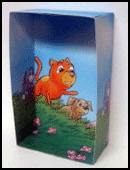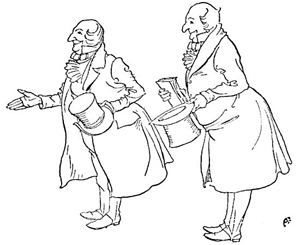|
"Let me leave it alone, then," said Scrooge. "Much good may it do you! Much good it has ever done you!"
"There are many things from which I might have derived good, by which I have not profited, I dare say," returned the nephew. "Christmas among the rest. But I am sure I have always thought of Christmas time, when it has come round--apart from the veneration due to its sacred name and origin, if anything belonging to it can be apart from that--as a good time; a kind, forgiving, charitable, pleasant time; the only time I know of, in the long calendar of the year, when men and women seem by one consent to open their shut-up hearts freely, and to think of people below them as if they really were fellow-passengers to the grave, and not another race of creatures bound on other journeys. And therefore, uncle, though it has never put a scrap of gold or silver in my pocket, I believe that it has done me good, and will do me good; and I say, God bless it!"
The clerk in the Tank involuntarily applauded. Becoming immediately sensible of the impropriety, he poked the fire, and extinguished the last frail spark for ever.
"Let me hear another sound from you," said Scrooge, "and you'll keep your Christmas by losing your situation! You're quite a powerful speaker, sir," he added, turning to his nephew. "I wonder you don't go into Parliament."
"Don't be angry, uncle. Come! Dine with us to-morrow."
Scrooge said that he would see him--yes, indeed he did. He went the whole length of the expression, and said that he would see him in that extremity first.
"But why?" cried Scrooge's nephew. "Why?"
"Why did you get married?" said Scrooge.
"Because I fell in love."
"Because you fell in love!" growled Scrooge, as if that were the only one thing in the world more ridiculous than a merry Christmas. "Good afternoon!"
"Nay, uncle, but you never came to see me before that happened. Why give it as a reason for not coming now?"
"Good afternoon," said Scrooge.
"I want nothing from you; I ask nothing of you; why cannot we be friends?"
"Good afternoon," said Scrooge.
"I am sorry, with all my heart, to find you so resolute. We have never had any quarrel, to which I have been a party. But I have made the trial in homage to Christmas, and I'll keep my Christmas humour to the last. So A Merry Christmas, uncle!"
"Good afternoon!" said Scrooge.
"And A Happy New Year!"
"Good afternoon!" said Scrooge.
His nephew left the room without an angry word, notwithstanding. He stopped at the outer door to bestow the greetings of the season on the clerk, who, cold as he was, was warmer than Scrooge; for he returned them cordially.
"There's another fellow," muttered Scrooge; who overheard him: "my clerk, with fifteen shillings a week, and a wife and family, talking about a merry Christmas. I'll retire to Bedlam."
This lunatic, in letting Scrooge's nephew out, had let two other people in. They were portly gentlemen, pleasant to behold, and now stood, with their hats off, in Scrooge's office. They had books and papers in their hands, and bowed to him.
"Scrooge and Marley's, I believe," said one of the gentlemen, referring to his list. "Have I the pleasure of addressing Mr. Scrooge, or Mr. Marley?"
"Mr. Marley has been dead these seven years," Scrooge replied. "He died seven years ago, this very night."
"We have no doubt his liberality is well represented by his surviving partner," said the gentleman, presenting his credentials.
It certainly was; for they had been two kindred spirits. At the ominous word "liberality," Scrooge frowned, and shook his head, and handed the credentials back.
"At this festive season of the year, Mr. Scrooge," said the gentleman, taking up a pen, "it is more than usually desirable that we should make some slight provision for the Poor and destitute, who suffer greatly at the present time. Many thousands are in want of common necessaries; hundreds of thousands are in want of common comforts, sir."
"Are there no prisons?" asked Scrooge.
"Plenty of prisons," said the gentleman, laying down the pen again.
"And the Union workhouses?" demanded Scrooge. "Are they still in operation?"
"They are. Still," returned the gentleman, "I wish I could say they were not."
"The Treadmill and the Poor Law are in full vigour, then?" said Scrooge.
"Both very busy, sir."
"Oh! I was afraid, from what you said at first, that something had occurred to stop them in their useful course," said Scrooge. "I'm very glad to hear it."
|



